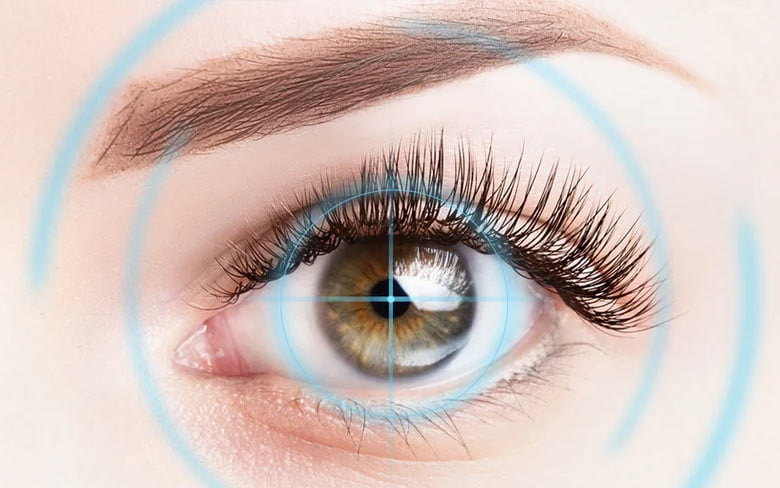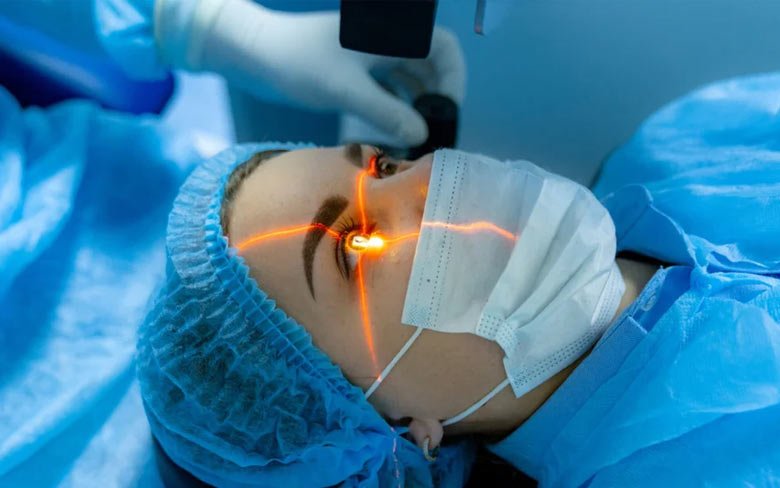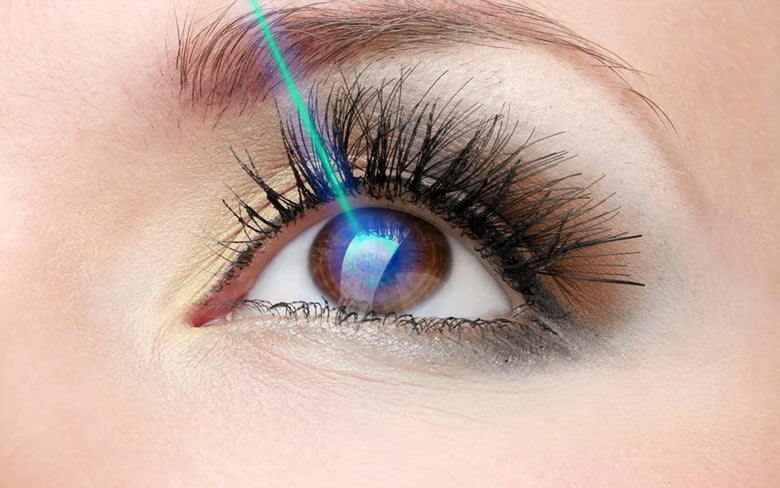Eye Laser
Eye Treatments
Eye Laser correction is a modern, popular, effective method.
It aimed at improving and restoring vision functions. This is the best way to reduce wearing glasses or contacts, or even stop using them completely.
If you have any questions, just contact us and let us find your answers! We look forward to your call!
Table of Content
So What Is
Eye Laser correction is a modern, popular, effective method. It aimed at improving and restoring vision functions. This is the best way to reduce wearing glasses or contacts, or even stop using them completely.
The procedure’s point is the use of laser. The laser beam is directed to the eye cornea. It changes cornea’s shape (optical properties). So the retina can correctly focus the image, thus, the process of improving vision occurs.
Treatment Plan
1. Day
Meet your treating doctor
Detailed examination of your eyes and confirmation, if you are suitable for eye laser
Final decision on the surgery method
Afterwards, you can relax, rest in the hotel or use the SPA
2. Day
Consultation with your treating doctor
Preparation and start of the eye laser surgery
Eye laser takes in average 10-15 minutes per eye
You will not feel any pain as the entire procedure is performed under local anesthesia
Information about what you should pay attention to in the next few days
Afterward you will leave the hospital, go to your hotel and relax
We strongly recommend that you diligently use the medications and eye drops that you receive from our clinic.
3. Day
Consultation with your treating doctor
Detailed follow-up examination of your eyes
Visual impairments for which eye laser surgery is recommended:
- Nearsightedness, or myopia means you see close things well but distant things blurry. Laser surgery helps with mild myopia.
- Farsightedness or hypermetropia is when far things are clear but close things are blurry.
- Astigmatism is when the cornea is uneven. Laser surgery can help with mild to moderate astigmatism.

Types and Methods
- Laser Keratomileusis (LASIK)
- Femto-LASIK (Femto-Laser Correction)
- Personalized support for laser eye correction (Custom Vue, Super-LASIK)
- Photorefractive keratectomy (PRK)
- Laser epithelial keratomileusis (LASEK)
- Small incision lenticule extraction (ReLEx SMILE)
Eye Laser Treatment for:
- People who are short-sighted.
- People who are far-sighted.
- People with astigmatism.
- People who’d rather not wear glasses or contact lenses.
Contraindications for laser surgery

Eye Laser Treatment is not for:
- Vascular, autoimmune and immunodeficiency conditions and diseases that reduce the body’s ability to recover (rheumatoid arthritis, multiple sclerosis, systemic lupus erythematosus, AIDS, etc.).
- Thin cornea and keratoconus can make laser eye surgery risky. Laser surgery might worsen vision problems in these cases. Another surgery, like a cornea transplant, might be needed then.
- Using of certain medications that have side effects of negative effect on the eyes.
- Thin cornea (less than 450 microns).
- Single eye.
- Progressive cataract with a significant decrease in the quality of vision.
- If you have a detached retina that hasn’t been fixed yet, you shouldn’t get laser surgery.
Laser Treatment Duration:
- PRK surgery takes around 15 minutes per eye.
- LASIK eye surgery usually takes around 10-30 minutes in total.
- LASEK surgery usually takes between two and three hours.
Laser Treatment Recovery Timeline:
- Patients can go home as little as 10-15 minutes after their LASIK surgery although they will need to be transported home by a friend or taxi.
- It’s possible to return to work after as little as 24 hours or within a few days depending on healing.
Possible Riscs for Laser:
- Temporary sensitivity to light.
- Blurred vision (usually temporary).
- Dry eyes
- Under or over correction
- Eye infections

Aftercare & Healing Process
Eye Laser Aftercare
Of course, we will also take care of you after your laser treatment!
Our medical consultants will take care of you during 1 year after the eye laser surgery.
If you need any assistance, if you have questions, you can contact our staff.
Eye Laser Healing Process
Healing Process after laser is very fast.
Eye Laser treatment of the eye is minimally invasive. The healing process is kept to a minimum and the risk of infection is very low, as there is no scar with sutures to heal.
Within 24 hours, most patients regain clear vision after laser eye surgery, while others need two to five days to recover. Blurred vision and fluctuations in vision may occur after surgery.
During the first week, wear the goggles you got from your doctor while sleeping and do not let tap water get into your eyes. You should also avoid eye make-up during the first week. You should refrain from competitive sports for the first 2 weeks. Diving and swimming as well as visits to the sauna and solarium are possible again after 4 weeks.
Top Eye Laser costs by country
The cost of eye laser surgery depends on the experience of the surgeon, the technique used, the clinic or hospital you choose, and your individual medical history.
The prices below are intended to give an approximate idea and are not binding prices. Your MedClincs consultant will be happy to provide you with details.
| Country | Price | Rating |
|---|---|---|
| Türkiye (Turkey) | ~ 1.300€ | ★★★★★ |
| India | ~ 5.200€ | ★★★★ |
| Germany | ~ 7.500€ | ★★★★ |
| USA | ~ 9.000€ | ★★★ |
FAQ
Why is eye laser surgery cheaper in Turkey?
In Turkey, salary and cost of living are lower than in Europe, in addition, the government supports the health sector. Therefore, an eye laser surgery in Turkey can be done without compromising on quality and standard, with lower costs at much cheaper prices.
Is it safe to have eye laser treatment in Turkey?
With over 2 million medical tourists per year, Turkey is one of the five world leaders in health tourism. Experienced doctors, together with a professional team, take care of patients expertly and competently. With approximately 86 million population, Turkey ranks 17th in the world in terms of population. Doctors have a lot of practical experience compared to other countries, which makes them competent professionals. It is safe to have your treatment in Turkey.
What are the advantages of eye laser treatment in Turkey?
You save money and costs, benefit from international quality and avoid long waiting times. In Turkey, you get the appointment for your eye laser surgery at short notice, in Germany you have to wait weeks. The short flight time from Europe is another advantage.
Which is the most used method of laser treatment?
The most widely used method of laser treatment in the world is LASIK treatment. PRK LASEK, ILASIK or SMILE techniques are also used to correct visual disorders with laser.
How is LASIK Eye Surgery performed?
During laser eye correction, a precisely calculated amount of corneal tissue is removed. This changes the surface curvature of the cornea and corrects the eye’s refractive error. The LASIK method spares the delicate surface of the cornea.
How does the LASIK treatment work?
As a result of reshaping the cornea, which is the transparent layer of the eye, with the Laser beam programmed through the computer according to the degree of visual impairment, correct focusing and clear vision is achieved.
What is Femto-LASIK?
Femto-LASIK is an innovative eye laser method. It is particularly gentle because instead of a knife, the cornea is processed with a laser. This laser is called femtosecond laser and works computer-controlled. This means that the incisions can be made with high precision.
What is iLASIK?
The iLASIK method combines femto- and wavefront LASIK. With the aid of fully automated eye diagnosis using the latest wavefront technology, highly precise laser eye results can always be guaranteed on the basis of the measurement data collected.
How painful is eye laser surgery?
Before the treatment, the eye is anesthetized, so you will not feel any pain.
How long does it take to have the eyes lasered?
The duration of the laser eye treatment is approximately between 5 and 15 minutes per eye.
How long do I have to wear sunglasses after laser eye surgery?
Immediately after the treatment, the eyes are slightly sensitive to light and should be protected. Wearing sunglasses is recommended for the first 24 hours after surgery.
Who can undergo laser eye surgery?
Patients should be over 21 years old, as the eyes can still change up to this age, and corneal thickness must be sufficient.
Why is corneal thickness so important?
During the treatment, a thin layer on the top of the cornea is cut. Then a laser is placed on the corneal surface, which opens it in a valve shape. In order to ensure that the cornea is still sufficiently stable even after surgery, the corneal thickness is so important.
What can be corrected with eye laser treatment?
Eye laser treatment corrects nearsightedness up to 10 degrees, astigmatism up to 6 degrees and farsightedness up to 6 degrees.
Who is not suitable for laser eye surgery?
Pregnant women, patients who are breastfeeding, people with diabetes, rheumatic diseases, high eye pressure or cataracts are not suitable for laser eye surgery.
What complications can occur?
The complication rate for laser eye surgery is well below 1 %. Depending on the method chosen, various discomforts may occur, such as increased sensitivity to glare or reduced visual acuity in twilight and glare.
Normally, however, the patient already has good vision the following day. Dry eyes are often a problem after eye laser surgery. However, this can be treated with the respective eye drops that you receive from your doctor.
Will the result of laser correction last forever?
During the laser procedure, the laser reshapes the shape of the cornea and the result is stable. However, in some people, despite successful vision correction, a partial return of diopters is possible. It depends on the individual
Is the procedure done on both eyes at the same time?
Yes, the procedure itself is very short and allows simultaneous correction of both eyes. In addition, simultaneous vision correction helps the neuroadaptation of the brain.
What type of anesthesia is used during the procedure?
Anesthesia is given in the form of eye drops that will help your eye lose sensation. Sometimes a drug is taken orally to help you relax.
Will I have a blindfold?
After the LASIK procedure, you will receive special glasses that you will take off the next day when you come for your first follow-up visit. After the LASEK procedure, the doctor will put you therapeutic contact lenses. You must wear them for 5–6 days.
What happens if I make an involuntary movement or blink after the procedure has already begun?
No worries. You won’t do anything so terrible if you blink or move. If you make a sudden movement of your head, the laser will simply stop working and start working again when the doctor returns you to the desired position.
Can you go blind from laser vision correction?
No. In the entire history of the existence of the laser vision restoration method, not a single case of blindness from this procedure has been recorded.
Can I contact my doctor when I am back home?
Of course, you can get in regular contact with your doctor, who will be available to answer any questions you may have. Also, our team is always available for you.
Eye Laser History:
- Greeks and Romans observed the magnifying effect of water-filled glass balls in ancient times.
- Initial glasses were round lenses in frames, evolving over 500 years to be worn on the nose with temples.
Timeline of Eye Laser Treatment:
- 1939: Dr. Sato performed the first radial keratotomy in Japan.
- 1976: Excimer laser used by IBM for microchip production.
- 1985: First PRK correction performed in Berlin by Dr. Theo Seyler.
- 1988: First LASIK procedure carried out in Novosibirsk, offering rapid recovery and high accuracy.
- 1989: Dr. Ruiz introduced ALK method for myopia correction.
- 1991: Dr. Ioannis Pallikaris made improvements to LASIK technique in Crete.
- 2001: Femtosecond laser first used in ophthalmology.
- 2003: EPI-LASIK and IntraLASIK techniques developed, expanding options for laser vision correction.
Popularity of Eye Laser Treatment:
- Since the late 80s, excimer laser vision correction has rapidly spread worldwide, becoming a preferred method for millions with myopia, hyperopia, and astigmatism.
- Ongoing advancements in ophthalmology continually expand the scope of laser correction, offering effective solutions even for complex refractive errors.
Types of Treatments
Request Form
Get your free consultation
- Need guidance and reassurance?
- Talk to a real person from MedClinics!
- Let's find the perfect doctor together.